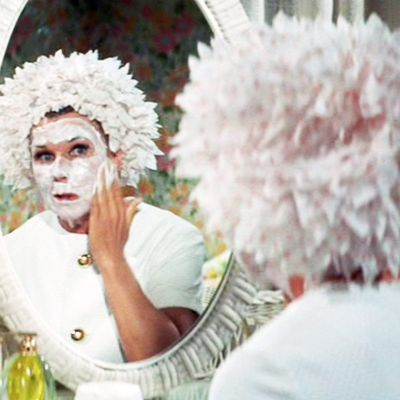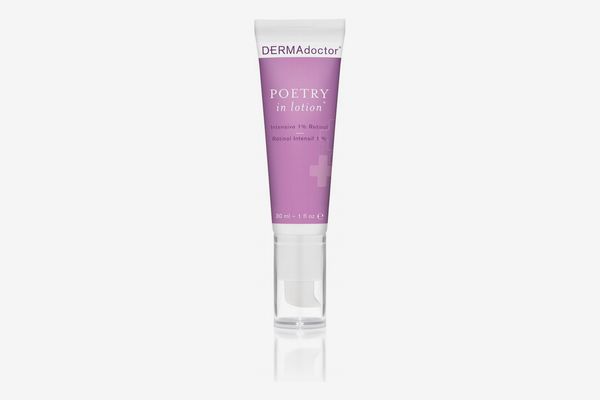
One of the best perks of my time working as beauty writer was getting to interview top celebrity dermatologists and sneaking in a question of what I should be using on my regular-person-in-her-30s skin. With all of the night creams, wrinkle creams, eye creams, and under-eye creams, every single dermatologist told me to stick to the basics: sunscreen for daytime and retinol at night. And it wasn’t just the dermatologists saying this. Nicole Kidman, Chrissy Teigen, and Jodie Comer have all endorsed it, too. Buzz Bissinger uses it every night. I was convinced.
I started with a prescription, first for Retin-A, then Tazorac, the purest forms of retinoic acid. They both made my skin peel off in sheets. Not wanting to resemble a pale, molting lizard, I switched to weaker, over-the-counter retinol versions. (I should mention that the other great perk of being a beauty writer was getting to sample more than a dozen varieties of retinol oils and creams and wipes, from drugstore to designer brands, for free from the beauty closet.) They were nearly as harsh.
I spent the next several months with an itching, stinging, red, sensitized, or peely face. Oh, and I still had acne and wrinkles. Cool, cool. Part of the problem was that it usually takes about 12 weeks to see actual results from retinols. By week three, I’d be crying uncle (and sometimes just crying). Even though I always followed best practices — apply to dry skin, never use more than a pea-size amount, and only apply every other night until my skin was able to tolerate it nightly — I could never get to the point of nightly use. Applying makeup in the morning became a nightmare. My skin looked like I’d just been skiing: chapped, sore, and windburned pink.
There are some retinols specifically designed for sensitive skin, so I tried those next. They actually didn’t make my skin angry, which was great! But only until I realized that that was because they did nothing at all. I grabbed one last sample out of my beauty-closet haul: DermaDoctor Poetry in Lotion. It said it was made by a dermatologist, which most of the others didn’t. It promised to be high potency, but was also formulated specifically to cause less dryness, redness, and irritation. And it had simple and attractive packaging, which somehow always works on me. Plus, when I looked on the company’s website, I saw that, in their 53-person skin patch study, not a single participant developed those side effects.
I’m usually skeptical about studies like that — funded by a company with an agenda, more likely conducted in an office conference room than a clinical setting — but count me in as test-case number 54. I couldn’t believe it when I made it through the entire 12 weeks. I was even able to eventually use it every night. The best part, though, isn’t what the cream doesn’t do — cause flaking, tightness, redness, or sensitivity. It was what it does: make my pores look smaller, control my acne, soften my skin, and minimize fine lines.
I asked a dermatologist, Dr. Noelle S. Sherber at Sherber + Rad in Washington, D.C., why this one brand might have been different for me. She said it was likely because of the type of retinol. Poetry in Lotion uses a micro-encapsulate, which she says “releases over time and can be gentler on the skin than formulas that flood the skin on contact.” Also, it’s based in a lotion, and “hydrating or moisturizing formulas can help skin better tolerate the retinol without irritation,” she says.
Whether it was one, the other, or both reasons, I felt like Goldilocks finally finding the perfect porridge — only instead of helping me fall asleep in someone else’s bed, this porridge was going to make me look young forever. Or at least right now: Just the other day, someone thought I was my toddler’s babysitter instead of his mom.
The Strategist is designed to surface the most useful, expert recommendations for things to buy across the vast e-commerce landscape. Some of our latest conquests include the best acne treatments, rolling luggage, pillows for side sleepers, natural anxiety remedies, and bath towels. We update links when possible, but note that deals can expire and all prices are subject to change.






